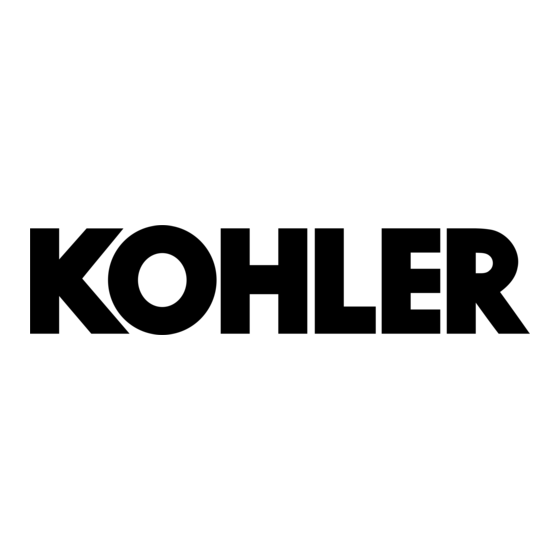Kohler 20EORDB Операція - Сторінка 27
Переглянути онлайн або завантажити pdf Операція для Портативний генератор Kohler 20EORDB. Kohler 20EORDB 48 сторінок. Commercial/recreational mobile generator sets

3.7 Cooling System
WARNING
Hot coolant and steam.
Can cause severe injury or death.
Before removing the pressure cap,
stop the generator set and allow it to
cool. Then loosen the pressure cap
to relieve pressure.
Allow the engine to cool. Release pressure from the
cooling system before removing the pressure cap. To
release pressure, cover the pressure cap with a thick
cloth and then slowly turn the cap counterclockwise to
the first stop. Remove the cap after pressure has been
completely released and the engine has cooled. Check
the coolant level at the tank if the generator set has a
coolant recovery tank.
3.7.1
Checking the Cooling System
To prevent generator shutdown or damage because of
overheating, keep the cooling air inlets clean and
unobstructed at all times. Inspect the radiator's exterior
for obstructions and remove dirt and foreign material
with a soft brush or cloth to avoid damaging the radiator
fins. Check the hoses and connections for leaks and
replace any cracked, frayed, or spongy hoses. When
checking the coolant level, also check the rubber seal of
the radiator's pressure cap and replace a cracked or
deteriorated cap. The pressure cap raises the boiling
point of the coolant, enabling higher operating
temperatures. If the cap leaks, replace it with the same
rating type of cap. See Figure 3-7. Remove dirt and
other debris from the pressure cap and filler neck. See
Figure 3-8 for thermostat rating. See Figure 3-9 for
coolant capacities.
Pressure Cap Rating
10EOR(Z)DB and 9EFOR(Z)DB
15EOR(Z)DB and 12.5EFOR(Z)DB
20EOR(Z)DB and 16.5EFOR(Z)DB
30/40EORZDB and 25/33EFORZDB
Figure 3-7 Pressure Cap Rating (For Inline Radiator
Models)
Thermostat Rating
All Models
Figure 3-8 Thermostat Rating
TP-6551 2/14
97 kPa
(14 psi)
83--110 kPa
(12--16 psi)
48 kPa
(7 psi)
82_C (179_F)
Model
10EOR(Z)DB
9EFOR(Z)DB
15EOR(Z)DB
12.5EFOR(Z)DB
20EOR(Z)DB
16.5EFOR(Z)DB
30EORZDB
25EFORZDB
40EORZDB
33EFORZDB
Figure 3-9 Coolant Capacities
3.7.2
Draining the Cooling System
The radiator contains a coolant drain valve to drain the
cooling system. When draining the coolant, remove the
radiator's pressure cap: this will allow the entire system
to drain and will prevent air pockets from forming and
restricting coolant passage to the block.
Note: Pay special attention to the coolant level. After
the coolant drains, allow time for complete refill of
the engine water jacket. Check the coolant level
as described earlier.
3.7.3
Filling the Cooling System
1. Remove the radiator's pressure cap.
2. Close the radiator's and/or engine block's coolant
drain valve(s) and tighten the hose clamps.
Note: Do not add coolant to a hot engine. Adding
coolant to a hot engine can cause the cylinder
block or cylinder head to crack. Wait until engine
has cooled.
3. Fill the radiator with the recommended long-life
coolant or an extended-life coolant.
Figure 3-10 for coolant recommendations.
Coolant Specifications
United States
ASTM D6210, D4985
Japan
JIS No. K-2234
International
SAE J814C, J1941, J1034, or J2036
Figure 3-10 Coolant Recommendations
Note: Always use a mix of coolant and water. Never use
water only.
Note: Follow the coolant manufacturer's instructions for
mixing coolant and water.
Section 3 Scheduled Maintenance
Engine & Unit-
Engine,
Mounted Radiator,
L (Qts.)
L (Qts.)
1.8 (1.9)
4.1 (4.3)
2.0 (2.1)
9.1 (9.6)
2.7 (2.8)
9.3 (9.8)
4.2 (4.4)
15 (16)
4.2 (4.4)
15.8 (16.7)
See
27
